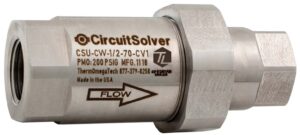How Can Legionella Grow in Cold Water Systems?
Stagnant, warm water in a plumbing system increases the risk of Legionella bacteria growth. In cold water systems, adequate flow through high fixture usage and low water temperatures discourage the growth of Legionella and other biofilms. However, in the event flow throughout the system or part of the system is insufficient, standing water can drastically increase the likelihood of bacteria colonization.
When cold water flow is minimal or stopped altogether, as seen during the recent COVID-19 lockdowns that left buildings unoccupied for long periods of time, disinfectant levels evaporate, and temperatures gradually rise in the Legionella growth range, leading to bacteria colonization and uneven free chlorine distribution throughout the system.
Legionella bacteria causes Legionnaires’ disease, a type of pneumonia infecting the lung. People can get sick when they breathe in water droplets or accidentally swallow water containing Legionella.
The CDC says Legionella grows best in a building’s cold water distribution system within a specific temperature range of 77°F-113°F (25°C-45°C). Cold water temperature throughout the system should be maintained at or below 77°F (25°C) to the greatest extent possible to inhibit growth.

To discourage Legionella bacteria growth, cold water systems need to be recirculated. They must be balanced appropriately to establish continuous flow and keep line temperatures below 68°F (20°C), the point at which Legionella can begin to colonize.
The Veterans Health Administration (VHA) aims to prevent the spread of healthcare-associated Legionella disease and scald injury from water systems in VHA buildings where patients, residents, or visitors stay overnight with the VHA Directive 1061(1).
The directive states, “The use of piping system insulation, automatic drain devices, and recirculation to limit the rate and duration of an increase in cold water temperature in combination with appropriate biocide levels can be effective at preventing Legionella growth.”
The Need for Dynamic Balancing
In order to achieve stability, system balancing must be dynamic – continually addressing the ever-changing conditions. Thermostatic balancing valves adjust dynamically, providing the best opportunity for sustainability and Legionella mitigation. Traditional manual balancing valves could provide a solution to cold water balancing, but their static operation inherently does not factor in nor adapt to the realities of everyday system operation & changes, which may render the balancing obsolete over time.
CircuitSolver® Union Cold Water (CSU-CW) Balancing valve will automatically keep cold water moving and maintain water quality, reducing stagnation and the growth of bacteria.
Utilizing our proprietary thermal actuator as the controlling element, the valve should be installed at the end of each branch or riser in a cold water recirculation system. It will modulate open or closed in response to the water temperature to maintain a specified temperature in the line.
The CSU-CW valve features a union with an optional check valve built into the body of the CircuitSolver® to reduce the number of system components installed and minimize potential leak points.
CSU-CW benefits:
- Stainless Steel, which is highly resistant to scaling in high mineral content environments
- High thrust actuator keeps orifice free of debris
- Union with integrated O-ring for a leak-free seal
- Keeps water temperature in branches/risers evenly distributed, minimizing heat gain
- Never fully closes, some water always passing through
- Provides even distribution of residual chlorine levels
These systems have become more prominent in VA hospitals because of the VHA 1061(1) directive; however, any commercial building such as schools, hotels, high-rise, and multi-family apartment buildings can benefit from implementing a cold-water recirculation system to protect the water lines from the risk of bacteria colonization during periods of low flow or non-use.
Watch how it works and see how the CircuitSolver® Union Cold Water thermostatic balancing valve automatically and continuously balances your cold-water recirculation system to discourage Legionella bacteria colonization and reduce stagnation.
Find out more here.
